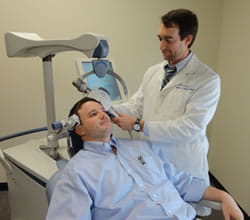What Types of TMS Does MUSC Health Offer?
MUSC Health offers three unique options for transcranial magnetic stimulation:
Repetitive TMS (rTMS)
Repetitive TMS, or rTMS, is the traditional approach to TMS. This treatment typically includes six weeks of daily treatments. rTMS takes 20 minutes a session and is done once a day. The MUSC Brain Stimulation Clinic is the first in South Carolina to provide this treatment to people with OCD and those wanting to stop smoking or using tobacco/nicotine.
Accelerated TMS
Accelerated TMS involves 10 minutes a session with multiple daily doses of TMS, aiming to expedite positive outcomes for patients with depression.
SNT, or SAINT, TMS
If you suffer from major depressive disorder (MDD), you may benefit from SNT TMS (formerly known as SAINT TMS). MUSC Health is the first in the country to commercially launch this innovative, and FDA approved, approach in delivering TMS for depression. SNT TMS has nearly an 80% remission rate.
SNT therapy uses MRI scans to target the best part of your brain to treat depression with neurostimulation. This involves getting functional MRI (like movies of the brain, not still images).The targeting process helps not only identify the location for stimulation, but also for correct dosing. A process known as theta burst stimulation involves a pattern of magnetic pulses delivered to cause neurons to fire and rebuild connectivity. The MRI scan, which takes approximately 45 minutes, will occur prior to your treatment. Once the personal target from the scan is analyzed and delivered, treatment can begin. SNT treatment consists of 10 sessions per day for five consecutive days. Each session includes 10 minutes of stimulation followed by a 50-minute rest period.
How Does MUSC Health Use TMS?
MUSC Health uses the all variations of TMS to treat depression, OCD and for smoking cessation. Patients can relax, read, or listen to music while a small curved device, about the size of a cupped hand, delivers focused magnetic stimulation directly to the area of the brain thought to be involved with regulating mood. The magnetic field pulses are the same strength as those used in magnetic resonance imaging (MRI) machines.

TMS for Depression
Approximately 30% of patients with severe depression fail to respond to treatment with antidepressants. Before TMS was available, "treatment-resistant" patients often received Electroconvulsive Therapy (ECT). While ECT can be highly effective, some patients experience unwanted side effects, including short-term memory loss or headaches. ECT requires a patient to take some time off work and not drive, which is not feasible for many people.
TMS offers more convenience and provides good outcomes for patients who have treatment-resistant depression. Accelerated TMS can be especially beneficial for individuals who have not found relief from depression through conventional treatments. It offers new hope and a chance for a better quality of life.
TMS for Obsessive Compulsive Disorder (OCD)
Obsessive compulsive disorder (OCD) is a chronic, often disabling disorder defined by distressing and intrusive thoughts and repetitive behaviors that the person feels driven to do. About 40% of people with OCD do not respond to medications or OCD therapy, and few people find their symptoms resolved.
TMS was FDA-approved in 2018 for the treatment of OCD, and it is thought TMS modifies the brain networks involving Obsessive Compulsive Disorder. By activating the neurocircuitry of OCD and then stimulating those regions, TMS can reduce symptoms in people with treatment resistance to medications and OCD therapy. The FDA noted that 38% of patients receiving TMS had at least a 30% reduction in symptoms, compared with 11% of patients who received sham TMS. Recent real-world data has proven TMS to be even more successful for OCD treatment than originally thought, with over half (nearly 58%) of patients receiving a clinically significant response to treating OCD symptoms. Studies suggest that the mechanism of action of TMS for OCD is different from medications and OCD therapy, and non-response to either is not a predictor of response to TMS.
MUSC Health was the first service in South Carolina to have TMS treatment for OCD.
TMS for Smoking
Smoking is one of the leading causes of death in developed countries. The addiction to nicotine, similar to the addiction to drugs and alcohol, involves modulation of the brain reward system and causes the uncontrollable desire to smoke. Cigarette smoking has been found to harm nearly every organ system in the body and is the leading cause of preventable death in the U.S. and of disease burden worldwide Many people can't quit alone and fail to respond to nicotine replacement therapies.
TMS was FDA-approved for smoking cessation in 2020. The TMS reduces craving by stimulating brain regions associated with craving. In a prospective, double-blind, randomized, sham-controlled, multi-center trial, 262 people were randomized into two groups: an active treatment group treated with Brainsway's H4 Deep TMS coil and a sham (placebo) control group. The treatments were performed daily, five days a week for three weeks, followed by an additional three sessions once a week for three weeks (18 sessions over six weeks). Of people completing the treatment, 28% quit smoking for more than four weeks, compared to 11% of people who received a placebo. Of people who didn't quit, those who received TMS smoked less per day than those who received a placebo.
MUSC Health was the first service in South Carolina to have TMS treatment for smoking cessation.




